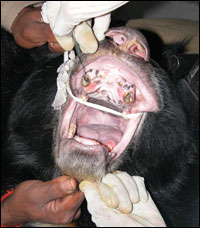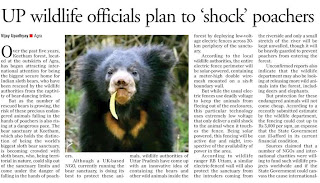B(e)aring their teeth for London doc
Vijay Upadhyay
Agra. All of us seek the help of our neighbourhood dentist at some point of life for our tooth ailments but when a 120 pound sloth bear got a toothache in its 6-inch canine, the wildlife authorities had to call a dentist from London.
Paul Cassar, a root-canal treatment specialist from East Sussex, England performed dental surgeries on about 20 bears at the Agra Bear Rescue Centre last week on invitation from the International Animal Rescue and UP Wildlife authorities.
According to Mr KK Singh, the Divisional Forest Officer (Wildlife), Uttar Pradesh (Chambal range), the bear rescue centre established on the outskirts of Agra has been playing host to almost 100 sloth bears who had been rescued by the animal welfare organisations from being made to dance on the roads in various parts of the country. The latest batch of Eight bears arrived this week from Hyderabad.
He said that it was customary for the bear-taming tribe or Kalandars to break off the pointed ends of the canines of the sloth bears at the time of their capture to prevent them from inflicting injuries to tamers and also to make them appear "cute and cuddly" instead of scary in the photographs it was made to pose for all around the country.
Sometimes, he said, in the process of breaking the points, these canines get broken off completely from the root, injuring the soft tissue of the jaw, which in due course of time, gets infected and then begins the ultimate torture for the bear as it becomes the victim of a permanent toothache and considering the size and ferociousness of the bear, treating its teeth is not a job for the faint-hearted.
Besides, according to Mr. Singh, a six inch bear canine cannot even be compared with a man's tooth and the cavity that requires to be filled after the root-canal treatment is so huge that it calls for specialists in this field to perform this daunting task.
He said that in all, there were 18 bears that underwent dental surgery at the Bear Rescue Centre last week, who were suffering from similar ailment.
He said that since the permanent toothache in the rescued bears created mood-swings in the bears, making them short-tempered and violence-prone, it made it difficult to rehabilitate them without treating this problem first.


Comments